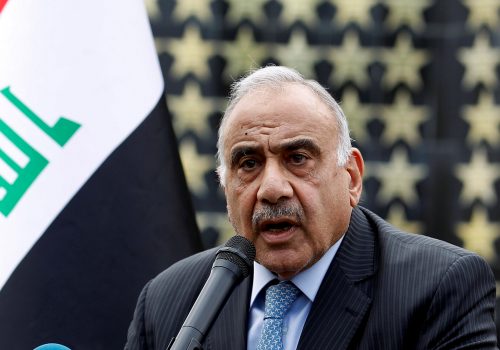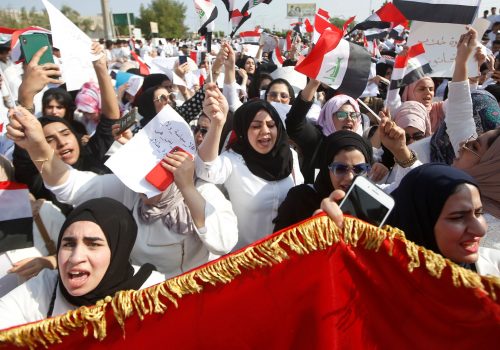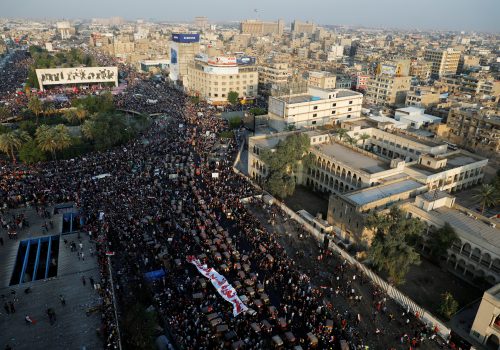The Iraqi prime minister’s resignation: A way ahead for the United States
Iraq’s Prime Minister, Adil Abdul-Mahdi, should be feeling a great sense of relief. Since mid-October, media outlets have reported his intent to resign amid violent protests that have engulfed much of Iraq. His resignation should be no surprise. Since the fall of Saddam, Iraq has a history of picking leaders who do not pose a threat to anyone’s interests. Abdul-Mahdi himself seems to understand that such compromise is no way forward. He publicly offered his resignation at the end of October; however, Iran reportedly intervened to ensure a useful ally remained in power. On December 1, 2019, he made another offer to resign, which parliament was quick to accept.
Parliament, of course, had no choice. The choices for democratically elected leaders whose security forces have killed more than 400 of the country’s own protesting citizens are limited, especially when protestor demands seem reasonable. Jobs, electricity, and an end to malign Iranian influence are critical to ensuring not just Iraq’s stability, but its future prosperity. Under such circumstances, Western governments would have been hard pressed to find reasons to invest in Iraq, politically or economically, as long as Abdul-Mahdi, and leaders like him, remain in power.
Iranian influence
Of course, Abdul-Mahdi could have chosen to rely on Iran for even more support to remain in power. The trouble with that plan is that it is partially Iranian influence that ignited the protests in the first place. Iran’s influence thrives by exploiting those aspects of Iraqi politics and culture that ensure its continued stagnation. Where the United States and its Western partners have tried to give Iraq the tools necessary to combat corruption and unify its diverse population, Iran has exploited that corruption to co-opt the Iraqi government into serving its interests and has used those divisions to ensure leaders who do not share Iran’s interests are excluded from positions of power. The most malicious example of this influence is its use of proxies to extort, displace, or “disappear” Sunnis, Christians, and even Shia who do not sign up for the Iranian program. Of course, Iraqis of all sects are fed up with Iran and its own government it is largely credited for co-opting.
Iran’s influence thrives by exploiting those aspects of Iraqi politics and culture that ensure its continued stagnation.
The next Iraqi prime minister
But Abdul-Mahdi’s resignation is not the end of the problem; rather, it is the beginning. The next Iraqi prime minister needs to direct government funds away from corrupt and inefficient agencies and instead towards recovery and reconstruction. He needs to invest in major infrastructure improvements, especially energy and transportation, so the economy can grow. Even trickier, he needs to promote the development of a private sector without destabilizing the state-owned institutions that are Iraq’s biggest employers. While doing all this, he also needs to avoid the appearance of sectarian loyalties, and not appear under the influence of foreign powers, especially Iran and the United States. None of that is going to be easy. Addressing any of those concerns attacks entrenched interests, which could result in more protests.
The problem for the United States is determining how to take advantage of this opportunity and determine what it can do to help without getting in the way. Ultimately, only the Iraqis can reduce the corruption and division that the Iranians exploit. Moreover, only the Iraqis can determine the best way to account for its populations’ diverse interests.
Still, the United States can help by shoring up its efforts to counter the malign effects of Iranian influence.
US support
First, the United States should express support for the protestors’ demands for a functional and inclusive Iraqi government that can deliver on essential services. Second, the United States needs to be clear that whatever form the new government takes, continued US support, whether political, economic, or security, is contingent on taking US interests into account. Third, the United States should make clear that its interests are compatible with Iraq’s. The United States can help integrate Iraq into the international community in ways the Iranian regime has not been able to do since it came to power in 1979. The protestors seem to get this. The United States just needs to let the new government know that its path to success depends on the kind of integration that only the United States can offer.
The United States and Iraq “win” when Iraq is prosperous, united, and a contributing member to the international community. Such an outcome is exactly what Iran does not want. And while Iran will continue to exploit individual Iraqis to see to its interests, Iran can do nothing for Iraq’s interests. The protesters seem to recognize this too. The United States needs to use the leverage it has to ensure the new government understands this as well.
Dr. C. Anthony Pfaff is a Nonresident Senior Fellow with the Atlantic Council’s Iraq Initiative and Research Professor for Strategy, the Military Profession and Ethic at the US Army War College. The views expressed here are those of the author and not necessarily the United States Government.
Image: Iraqi Prime Minister Adel Abdul Mahdi and Hadi al-Amiri member of the Iraqi Parliament and Leader of Badr Organisation, attend a symbolic funeral ceremony of Major General Ali al-Lami, who commands the Iraqi Federal Police's Fourth Division, who was killed in Salahuddin, in Baghdad, Iraq October 23, 2019. REUTERS/Khalid al-Mousily


